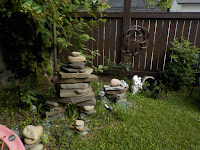For me a new year is
an open, brand-new journal. A pretty one, because I like pretty. The prettier
my journal the harder I try to make each story or poem unique. At year ends, I
have a treasure house of my thoughts to read. Sadly, the more recent the
journals, the emptier the pages. Somehow, I’ve allowed myself to get off track.
My direction and discipline have packed up and left.
I need a plan. One to keep
me on track. I though back over the
previous year. My well-intended writing time had been crowded out by other
things. Feeling ashamed of myself for allowing this to happen, I asked God to
help me in these areas this year. An
element of peace crept into me.
Then, alas, life set in.
The phone rang. My son
had suffered another medical episode. I grabbed my coat and keys and was out
the door in minutes. Hours later, I returned, totally exhausted. My laptop
remained on the ottoman right where I left it. The discipline and direction I’m
promised myself earlier shriveled up, and I flopped across my bed, only to be
woken up a few hours later. My son needed care. This went on for three days.
The next three days I flat-lined. Now, six days later, I retrieve my laptop
from the ottoman where I’d laid it all those days ago.
Prepared to continue
with my thoughts, I re-read what I’d written, but the discipline and direction
no longer felt so important or possible. I prayerfully stared at my screen
wondering if my writing days were withering. Self pity popped in to join me for
a cup of tea. The tea was delightful, and the conversation was all one-sided.
Mine. But, as the conversation moved on, little spots of light appeared and
grew. Self-pity excused herself for another appointment, and my mind kicked
into gear.
 I have less control of
my life than most people, so direction and discipline can be no more than an
illusive dream. Or I can dwell on them and turn into an old hag. But I choose
not to. My prayer for this year has changed to, “Lord, help me recognize the
small openings in my life in which I can sit and write, and please enable my
mind to kick into its writing mode quickly.”
I have less control of
my life than most people, so direction and discipline can be no more than an
illusive dream. Or I can dwell on them and turn into an old hag. But I choose
not to. My prayer for this year has changed to, “Lord, help me recognize the
small openings in my life in which I can sit and write, and please enable my
mind to kick into its writing mode quickly.”


